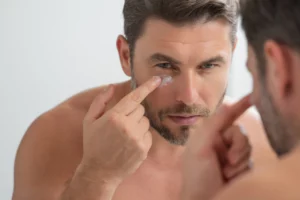peeling for black and mixed-race skin est un traitement esthétique visant à améliorer la qualité de la skin en exfoliant les couches superficielles de l’épiderme. Spécialement formulé pour répondre aux besoins spécifiques des peaux foncées, ce peeling utilise des acides doux pour éviter l’hyperpigmentation et stimuler le renouvellement cellulaire sans agresser la peau. Il aide à traiter des problèmes comme les taches brunes, le teint irrégulier, l’acné et les cicatrices. Réalisé par un médecin expérimenté, le peeling permet de retrouver une peau éclatante, uniforme et plus lumineuse, tout en respectant cette peau délicate.
Le peeling chimique est une technique de médecine esthétique largement utilisée pour améliorer la qualité et l’éclat de la peau. Cependant, lorsqu’il s’agit des peaux noires et mates, une prise en charge particulière est nécessaire pour éviter certains risques, notamment l’hyperpigmentation ou les cicatrices. La peau noire a des caractéristiques uniques qui la rendent plus
that peels are unsuitable for this skin type. With the right protocols and personalized care, a peel for Black skin can deliver visible results : improvement of skin tone, reduction of pigmentation spots, and a decrease in imperfections.

• Le peeling sur une peau noire requiert une attention particulière en raison de plusieurs facteurs liés à ses caractéristiques uniques.
Ce soin nécessite une approche spécifique en raison de la plus grande concentration de mélanine dans l’épiderme. La mélanine, responsable de la pigmentation, protège naturellement la peau des effets néfastes des rayons UV, mais rend également la peau plus sensible aux irritations et aux traumatismes cutanés, pouvant entraîner des hyperpigmentations post-inflammatoires. Cela signifie qu’un peeling mal adapté ou trop agressif peut provoquer des taches brunes ou des cicatrices indésirables.
- The dermis of black skin is generally thicker, making it more resistant to the signs of ageing, but this requires peels that penetrate effectively without irritating the skin.
• Les peaux noires ont souvent un équilibre délicat entre zones grasses et sèches, avec une tendance à être grasses sur la zone T et sèches sur d’autres parties. La peau présente un excès de sébum en surface mais le derme est mal hydraté. Le choix du type de peeling est complexe et minutieux.
- Skin reactivity is often more pronounced, making it more susceptible to inflammation. This is why a peel for black skin must be carefully customised to avoid side effects such as redness or irritation.

Le peeling présente de nombreux avantages pour les personnes à la peau noire, à condition qu’il soit effectué avec les bons produits et par un médecin expérimenté.
Les taches pigmentaires et l’hyperpigmentation sont des problèmes courants pour les peau foncées. Que ce soit à cause des cicatrices d’acné, des brûlures solaires ou d’une irritation de la peau, la production excessive de mélanine peut laisser des marques visibles. Un peeling chimique doux aide à exfolier les couches superficielles de la peau et à diminuer progressivement ces pigmentations, unifiant ainsi le teint.
La peau noire peut parfois présenter un grain de irrégulier, ce qui donne un aspect terne ou rugueux. Un peeling bien choisi permet d’éliminer les cellules mortes, d’améliorer la qualité de la peau et de lui redonner un aspect plus doux et plus lumineux.
Peels help unclog pores and eliminate blackheads and other impurities. By exfoliating the skin, they also help prevent future breakouts and maintain a clearer complexion over time.
Malheureusement il n’est pas possible de traiter les acne scars sur une peau mate car le peeling pour cette indication (peeling moyen ou profond) est contre-indiqué pour les peaux foncées.
For Black skin, it's essential to select peels that respect its sensitivity while minimizing the risk of post-inflammatory hyperpigmentation. The most commonly used peels for darker skin tones are :
L’acide salicylique dissout l’excès de sébum réduisant ainsi les points noirs, les pores dilatés et les boutons.
Avantages : ce peeling traite l’acné, aide à prévenir les futures éruptions et à réguler la production de sébum.
Indications : acne, excès de sébum, points noirs, pores dilatés, hyperpigmentation.
L’acide glycolique, un AHA dérivé de la canne à sucre, est un acide couramment utilisé dans les peelings superficiels. Bien qu’il puisse être utilisé sur des peaux noires, il doit être manipulé avec précaution pour éviter toute irritation, d’où l’importance de consulter un médecin expérimenté . En petite concentration, il aide à exfolier en douceur les couches superficielles de la peau et à stimuler le renouvellement cellulaire.
Benefits: smoothes the skin, treats uneven skin tone and improves skin radiance.
Indications : hyperpigmentation légère, teint terne, fine lines.
Le peeling à l’acide mandélique est particulièrement adapté pour les peaux mates car il pénètre lentement dans la peau, réduisant ainsi les risques d’irritation ou d’hyperpigmentation. L’acide mandélique est excellent pour traiter l’hyperpigmentation, les taches brunes et l’acné et a une action exfoliante douce.
Avantages : ce peeling agit en douceur, il unifie le teint et lisse la surface de la peau.
Indications: oily skin, mild acne, hyperpigmentation, uneven skin tone.
Le peeling Jessner est un mélange de plusieurs agents exfoliants (acide salicylique, acide lactique et résorcine). Il est recommandé pour traiter l’hyperpigmentation et les taches pigmentaires sur les peaux foncées. Toutefois, ce peeling doit être utilisé avec précaution par un médecin expérimenté pour éviter toute irritation.
Avantages : il exfolie la peau, améliore la densité de la peau et le teint, il aide à réduire les imperfections.
Indications: acne-prone skin and pigmentation spots.
Le nombre de séances nécessaires dépend du problème à traiter. En général 4 à 6 séances de peeling sont recommandées, espacées de 2 à 4 semaines, pour obtenir des résultats visibles et durables. Le docteur Romano vous proposera un plan de traitement personnalisé en fonction de vos besoins.
Darker skin is more prone to post-inflammatory hyperpigmentation after aggressive treatments. It is therefore crucial to take certain precautions before undergoing a peel.
• Consult an experienced doctor : it is essential that the peel be performed by a qualified doctor experienced in treating darker skin tones. The type of peel, acid concentration, and session frequency must be tailored to each patient.
• Do a patch test first : before any treatment, a test on a small area of the skin is recommended to check for tolerance and avoid any risk of reaction or hyperpigmentation.
• Avoid aggressive peels : medium peels and deep peels are contraindicated for darker skin tones, as they can lead to scarring or hyperpigmentation.
• Prepare your skin : before a peel, it is advisable to use products containing azelaic acid or vitamin C to help even out skin tone and reduce the risk of pigmentation after treatment.
• Sun protection : sun protection is crucial both before and after a peel, especially for darker skin tones. Use a broad-spectrum SPF 50 sunscreen to protect the skin from UV rays at least one month prior to the peel, in order to prevent the appearance of dark spots.

Après un peeling, la peau peut être plus sensible, rouge ou desquamer légèrement pendant quelques jours. Ces effets secondaires sont normaux et disparaissent rapidement. Pour maximiser les résultats et éviter toute complication, il est recommandé de suivre les conseils post-peeling.
- Moisturising: use a gentle, non-comedogenic moisturiser to promote healing and prevent dryness.
- Sun protection: apply a sun cream every day, even if you're not directly exposed to the sun. This helps protect the skin and prevent pigmentation spots.
• Évitez les produits agressifs : après un peeling, n’utilisez pas de rétinoïdes ou d’autres produits irritants pendant au moins un mois pour éviter toute irritation supplémentaire.
Le tarif d’une séance de peeling pour les peaux noires et métissées est de 200 CHF. Ce montant reste identique quelle que soit la nature de la peau ou l’objectif recherché. Le rythme des séances peut être ajusté selon les besoins et l’évolution cutanée, à l’issue d’une évaluation personnalisée. Le prix indiqué s’applique à chaque séance réalisée au cabinet du docteur Romano, à Genève.
Pour la peau noire, les peelings doux et assez espacées sont recommandés afin d’éviter le risque d’hyperpigmentation. Le peeling à l’acide mandélique est idéal pour les peaux sensibles et foncées, car il agit en douceur. L’acide lactique est également efficace pour hydrater et unifier le teint. Pour les taches pigmentaires, le peeling à l’acide glycolique ou kojique peut être envisagé, mais avec précaution.
Exfoliez la peau noire avec des produits doux, comme les exfoliants enzymatiques ou les acides légers (mandélique ou lactique). Limitez les gommages mécaniques agressifs, qui peuvent provoquer des irritations et favoriser l’hyperpigmentation. Une exfoliation une fois par semaine est suffisante pour préserver l’éclat de la peau sans l’agresser.
Yes, chemical peels are suitable for dark skin, but they must be carefully selected. Mild acids are preferred to minimize pigment-related side effects. It is essential to consult a physician experienced in treating darker skin tones to ensure safe and effective results.
Théoriquement, les peelings peuvent atténuer les taches pigmentaires sur les peaux noires. Les peelings à l’acide glycolique, kojique ou mandélique sont efficaces pour unifier le teint. Le traitement doit être associé à une protection solaire stricte pour éviter le risque d’hyperpigmentation post-inflammatoire. Toutefois, les résultats sont variables et souvent très légers.
Oui, le peeling chimique est efficace contre l’acné sur les peaux foncées. Les peelings à l’acide salicylique ou mandélique sont particulièrement recommandés, car ils régulent la production de sébum, désobstruent les pores et réduisent les imperfections tout en minimisant le risque de taches pigmentaires.